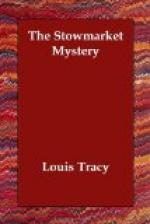“Fire away.”
“In the first place, your counsel tried to prove—did prove, in fact—that you walked straight from the ball-room to the Hall, sat down in the library, and did not move from your chair until Fergusson, the butler, told you how he had found Sir Alan’s body on the lawn.”
“Exactly.”
“So if a man comes forward now and swears that he watched you for nearly ten minutes standing in the shadow of the yews on the left of the house, he will not be telling the truth?”
“That is putting it mildly.”
“Yet there is such a witness in existence, and I am certain he is not a liar in this matter.”
“What!”
Brett and Hume ejaculated the word simultaneously; the one surprised, because he knew how careful Winter was in matters of fact, the other Indignant at the seeming disbelief in his statement.
“Please, gentlemen,” appealed the detective, secretly gratified by the sensation he caused, “wait until I have finished. If I did not fully accept Mr. Brett’s views on this remarkable case, I would not be sitting here this minute. My conscience would not permit it”
“Be virtuous, Winter, but not too virtuous,” broke in Brett drily.
“There you go again, sir, questioning my motives. But I am of a forgiving disposition. Now, there cannot be the slightest doubt that a poacher named John Wise, better known as ‘Rabbit Jack,’ who resides in this town, chose that New Year’s Eve as an excellent time to net the meadows behind the Hall. He had heard about Mrs. Eastham’s dance, and knew that on such a night the estate keepers would have more liking for fun with the coachmen and maids than for game-watching. He entered the park soon after midnight, and saw a gentleman walk up the avenue towards the house. He waited a few minutes, and crept quietly along the side of the hedge—in the park, of course. Being winter time, the trees and bushes were bare, and he was startled to see the same gentleman, with his coat buttoned up, standing in the shade of the yews close to the Hall. ‘Rabbit Jack’ naturally thought he had been spotted. He gripped his lurcher’s collar and stood still for nearly ten minutes. Then it occurred to him that he was mistaken. He had not been seen, so he stole off towards the plantation and started operations. He is a first-rate poacher, and always works alone. About three o’clock he was alarmed by a policeman’s lantern—the search of the grounds after the murder, you see—and made off. He entered Stowmarket on the far side of the town, and ran into a policeman’s arms. They fought for twenty minutes. The P.C. won, and ‘Rabbit Jack’ got six months’ hard labour for being in unlawful possession of game and assaulting the police. Consequently, he never heard a syllable about the ‘Stowmarket Mystery,’ as this affair was called by the Press, until long after Mr. Hume’s second trial and acquittal. Yet the first thing ‘Rabbit Jack’ did after his release was to go straight to the police and tell them what he had seen. I think, Mr. Hume, that even you will admit a good deal depended on the result of the fight between the poacher and the bobby, for ‘Rabbit Jack’ described a man of your exact appearance and dressed as you were that night.”




